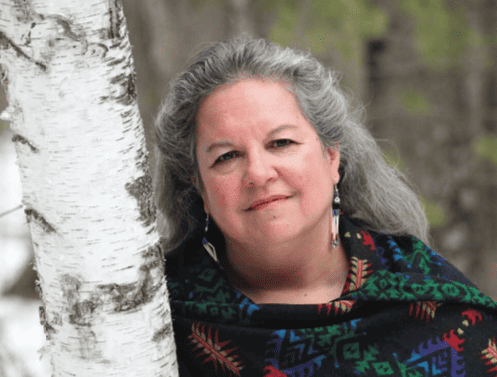Lula Burke, Editor-in-Chief—
As part of the 2023 Laura C. Harris Series, Dr. Robin Wall Kimmerer spoke in Swasey Chapel on March 28th. Her speech, titled “The Teachings of Plants,” emphasized the importance of gratitude for nature and ended with a standing ovation and song from Denison’s associate chair of dance, Ojeya Cruz Banks.
Wall Kimmerer, 69, is a scientist, enrolled member of the Citizen Potawatomi Nation, and professor currently working at the State University of New York. She is perhaps the most well known as the author of the bestselling novel “Braiding Sweetgrass,” which observes the differences in western and Native connections between humans and land. With a PhD in botany from the University of Wisconsin, she opened her speech with a note of gratitude for nature in Potawatomi language.
Her note of gratitude was first contextualized with images of berries and maple trees. She gave thanks to the “berry people” and “citizens of the maple nation,” explaining that viewing plants as equal species rather than resources to be exploited is the first step in changing the narrative surrounding sustainability.
“To traditional people, to everyone who loves berries and a good pie, we know that they are gifts. They are gifts from the other species who surround us,” she said. “And though we live in this world where other species shower us with gifts, we know that we are harnessed to institutions and economies that are relentless in asking, What more can we take?”
Her speech asked the audience to view themselves as part of an ecological community, rather than a species more worthy of rights and respect. Further, she asked the 200+ members of the auditorium to view land as home to more than just humans, but also the trees, flowers, mice, deer, and bugs who coexist with humans.
“What if we looked at the land through the Indigenous lens? I want to think about our Potawatomi teachings about what the land means. In so many Indigenous communities, land is understood as identity,” she said. “It’s who we are–we are inseparable from the land, both in body and in spirit. We also know that land is our sustainer.”
With this notion, she described the ways in which a western society could adopt practices to better treat the Earth, noting that technology-heavy societies need “more wisdom, not more knowledge.”
“In my imagination, there is a green path all soft and spangled with dew where you want to walk barefoot, and another of those paths is a dead end, and it’s black and burnt with cinders that would cut your feet,” Wall Kimmerer said. “The prophecy tells people that we have to make a choice about which path we want to be on–the path of materialism and greed that will destroy the Earth, or the spiritual path of the good life.”
She then asked the audience, which comprised mostly older Granville community members and professors and some students, “What do we love too much to lose?”
From there, she discussed the direct ways in which Indigenous communities connect with the land and species they coexist with, which could prompt a different mindset from western communities away from the notion of land as a “resource to be exploited.” She asked the audience to look at nature for guidance, pay attention to what the Earth asks from humans, and respect nature the way that one would respect another human being.
“The same kids who know 100 corporate logos know only 10 plants…of those plants, one is “Christmas tree,” so nine, right?” she said. “If we don’t know the names of the beings with which we share the Earth, which keep us alive, is it any wonder that we live in a society that recognizes legal personhood for corporations and no legal standing at all for maple trees or blue jays?”
“When you choose not to know the names of the people around you, you are not paying attention. It is a sign of respect,” she said.
She concluded with a traditional story of two spiritual brothers–Flint and Sapling–who were constantly in competition with each other as the forces of creation and destruction. The two played a peach-stone game that decided the fate of the world when all of the stones turned one way or the other. As the last stone was turning in the air, the stones in the bowl were all black-side up. The fate of the world, determined by the final stone, was hanging in the air. In Wall Kimmerers’ story, all of the beings in the world came together with a force strong enough to turn over the final stone.
“All creation gave a mighty shout. Its force caused the human foolishness to be overruled, and the power of their voices turned that last stone over as it fell into the dish. The color Trillium looming in the spring,” she said.
“It’s your responsibility now,” she finished.
Her speech ended with a standing ovation and time for questions from the crowd. The last person to step to the microphone was associate chair of dance Dr. Ojeya Cruz Banks, who discussed her research work in New Zealand and her cultural ties to Guam. Finally, she offered to sing Wall Kimmerer a song of thanks, mirroring Wall Kimmerer’s opening remarks. The song, called Bring Me Some Water Silvy, was written in the 1930’s by Black folk artist Lead Belly. The audience sat in awe as Cruz Banks sang and Wall Kimmerer was moved to tears.
Wall Kimmerer was the final speaker in the 2023 Laura C. Harris series.

